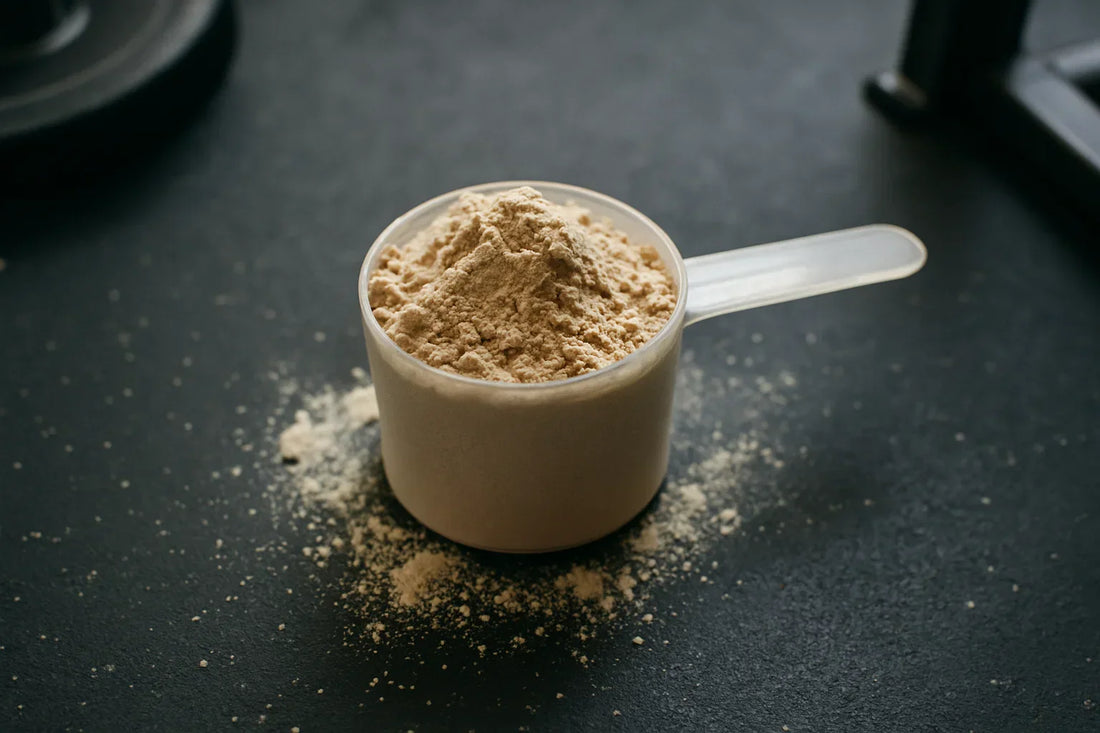
How Many Calories Are in 1 Scoop of Whey Protein?
Share
Are you tracking your daily calories but unsure about your protein powder intake? You're not alone. Many people wonder exactly how many calories are packed into that daily scoop of whey protein. The answer might surprise you with its variation.
1 scoop of whey protein calories typically ranges from 100-150 calories. This depends on the brand, type, and size of the scoop. But there's much more to understand about protein powder calories than just this simple range.
Let me break down everything you need to know about one scoop of whey protein and its caloric content. This will help you make informed decisions about your nutrition and fitness goals.
Understanding Protein Powder Calories
1 scoop protein powder calories vary significantly between brands and formulations. Here's what affects the numbers on your nutrition label.
Standard Calorie Range
Most whey protein powders contain 100-150 calories per scoop. This scoop typically weighs between 25-30 grams. However, some brands use larger scoops up to 35 grams.
The calorie content breaks down roughly like this:
- Protein: 19-30 grams (76-120 calories)
- Carbohydrates: 1-5 grams (4-20 calories)
- Fat: 1-5 grams (9-45 calories)
The calorie content of Protein Veda Men by Shivakam like this:
- Protein: 25 grams (100 calories)
- Carbohydrates: 3.86 grams (15.44 calories)
- Fat: 1.84 grams (16.56 calories)
What Affects Whey Protein Calorie Content
Several factors determine how many calories you'll find in your protein powder scoop.
Type of Whey Protein
Whey protein isolate tends to be lower in calories. It typically contains 100-120 calories per scoop. The extra processing removes more fats and carbohydrates.
Whey protein concentrate usually has slightly more calories. Expect 120-150 calories per scoop. It retains more of the original nutrients from milk.
Additional Ingredients
Flavoured protein powders often contain more calories. Added sugars can significantly increase the calorie count. Some flavoured versions contain up to 23 grams of added sugar per scoop.
Unflavoured protein powders typically have fewer calories. They contain minimal additives beyond the protein itself.
Scoop Size Variations
Scoop sizes aren't standardised across brands. A 25-gram scoop will have fewer calories than a 35-gram scoop of the same product. Always check the serving size on your specific brand's label.
How Whey Compares to Other Protein Types
Understanding where whey sits compared to other protein powders helps with your choices.
Calorie Comparison Chart
|
Protein Type |
Calories |
Protein |
Fat |
Carbs |
|---|---|---|---|---|
|
Whey Concentrate |
110-130 |
24g |
~1g |
~2g |
|
Whey Isolate |
100-120 |
24-25g |
<1g |
<1g |
|
Casein |
120 |
24g |
1g |
4g |
|
Plant-Based |
100-120 |
20-24g |
1-3g |
2-6g |
Key Differences
Plant proteins generally have slightly fewer calories than whey protein products. The difference is minimal though.
Casein protein typically contains more calories and carbohydrates than whey. It averages around 120 calories per scoop versus 110 for whey concentrate.
Plant protein quality varies significantly. Different sources like soy, pea, and hemp have different protein quality scores and calorie profiles.
Optimising Protein Intake for Your Goals
Your protein powder serving size should match your specific objectives and circumstances.
For Muscle Building
Higher protein intake works best for muscle growth. Research shows 1.6 grams of protein per kilogram of body weight daily is optimal. This might mean 1-2 scoops around your workouts.
A 70kg person aiming for muscle growth needs approximately 112 grams of protein daily. Your protein powder can help bridge the gap between whole food sources and your target.
For Weight Management
Moderate to high protein intake helps preserve muscle during weight loss. Aim for 1.5-2.0 grams per kilogram of body weight. Smaller, more frequent servings might work better for appetite control.
Protein has a higher thermic effect than carbs or fats. This means your body burns more calories digesting protein. Higher protein-to-calorie ratios support weight management goals.
For General Health
If you're not actively trying to build muscle or lose weight, 0.8-1.0 grams per kilogram is sufficient. Half to one scoop of protein powder can supplement your whole food protein sources.
Timing Your Protein Intake
When you consume your protein powder affects how your body uses those calories.
Post-Workout
Fast-absorbing proteins like whey isolate work well after training. Standard serving sizes of 20-30 grams provide the amino acids your muscles need for recovery.
Between Meals
Smaller serving sizes of 10-20 grams can help maintain protein synthesis throughout the day. This approach also helps with appetite control.
Before Bed
Slower-digesting proteins might be better in the evening. However, whey protein can still be effective if it fits your daily calorie goals.
Reading Nutrition Labels Effectively
Always check your specific protein powder's nutrition label. Formulations change and vary significantly between brands and flavours.
Look for:
- Actual scoop size in grams
- Total calories per serving
- Protein content
- Added sugars
- Fat and carbohydrate content
Different flavours of the same brand can have different calorie contents. Chocolate and vanilla flavours often contain more added sugars than unflavoured options.
Making Protein Powder Work for Your Calorie Goals
Understanding your protein powder's calorie content helps you make better nutrition decisions. Whether you're cutting, bulking, or maintaining, those 100-150 calories per scoop add up.
Track your intake accurately by weighing your scoops when possible. Scoop sizes can vary even within the same container.
Consider unflavoured options if you're watching calories closely. You can add your own natural flavourings like fruit or a small amount of cocoa powder.
Remember that protein powder is a supplement, not a replacement for whole food protein sources. Use it strategically to meet your daily protein needs while staying within your calorie targets.
The key is finding a product that fits your taste preferences, budget, and nutritional goals. Now you have the knowledge to make an informed choice about which protein powder calories work best for you.
